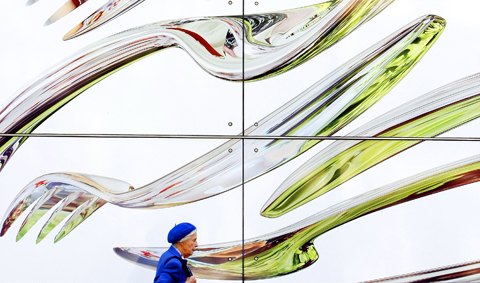Australia’s central bank said yesterday the country is accelerating faster than expected out of the global downturn thanks partly to demand from China, but warned against becoming too reliant on just a few countries for the recovery.
In its latest quarterly statement on monetary policy, the Reserve Bank of Australia (RBA) more than tripled this year’s growth forecast to 1.75 percent from the 0.5 percent it predicted in August and raised its forecast for next year to 3.25 percent from 2.25 percent.
RATE HIKE

PHOTO: REUTERS
The RBA — which last month became the first central bank of a developed economy to raise interest rates and hiked them again this week — signaled it would keep winding back a series of cuts that took rates to five-decade lows this year to keep the economy moving.
“A further gradual lessening of monetary stimulus is likely to be required over time if the economy evolves broadly as expected,” the bank said.
Australia’s stock market rallied yesterday, with the main benchmark rising nearly 2 percent. Since the start of the year, Australia’s currency has risen more than 30 percent while the stock market has climbed almost 24 percent.
There is growing evidence that Australia has weathered the economic downturn well.
The bank credited lower rates, some A$42 billion (US$37 billion) in government stimulus spending and “the strong bounce back in Asia, particularly in China.”
“Asia is at the forefront of the global recovery,” it said.
MINERALS
Helping drive Australia’s growth are the huge amounts of iron ore and other minerals it exports to China, Japan, South Korea and other nations.
The bank said export volumes had stayed broadly unchanged despite a sharp downturn in global trade and investment in the sector — especially in liquefied natural gas — is expected to grow.
“This expected rise in investment — which is already at a high level relative to GDP and compared with other developed economies — should further boost the supply side of the Australian economy, although as it takes place, short-term capacity restraints could again emerge in part of the economy,” the bank said.
In a speech late on Thursday, RBA Governor Glenn Stevens cautioned that outsized growth in the share of the economy taken up by mining could drain workers and other resources from other sectors, potentially reducing the economy’s resilience.
“The emergence of China and India is a benefit to Australia, but we stand to have a heightened exposure to anything going seriously wrong in those countries,” Stevens said.
Still, “such concentration ... may well be worth accepting if the return from doing so were high enough, as it appears they might be,” he said.

AT RISK: The council reiterated that people should seriously consider the necessity of visiting China, after Beijing passed 22 guidelines to punish ‘die-hard’ separatists The Mainland Affairs Council (MAC) has since Jan. 1 last year received 65 petitions regarding Taiwanese who were interrogated or detained in China, MAC Minister Chiu Chui-cheng (邱垂正) said yesterday. Fifty-two either went missing or had their personal freedoms restricted, with some put in criminal detention, while 13 were interrogated and temporarily detained, he said in a radio interview. On June 21 last year, China announced 22 guidelines to punish “die-hard Taiwanese independence separatists,” allowing Chinese courts to try people in absentia. The guidelines are uncivilized and inhumane, allowing Beijing to seize assets and issue the death penalty, with no regard for potential

STILL COMMITTED: The US opposes any forced change to the ‘status quo’ in the Strait, but also does not seek conflict, US Secretary of State Marco Rubio said US President Donald Trump’s administration released US$5.3 billion in previously frozen foreign aid, including US$870 million in security exemptions for programs in Taiwan, a list of exemptions reviewed by Reuters showed. Trump ordered a 90-day pause on foreign aid shortly after taking office on Jan. 20, halting funding for everything from programs that fight starvation and deadly diseases to providing shelters for millions of displaced people across the globe. US Secretary of State Marco Rubio, who has said that all foreign assistance must align with Trump’s “America First” priorities, issued waivers late last month on military aid to Israel and Egypt, the

‘UNITED FRONT’ FRONTS: Barring contact with Huaqiao and Jinan universities is needed to stop China targeting Taiwanese students, the education minister said Taiwan has blacklisted two Chinese universities from conducting academic exchange programs in the nation after reports that the institutes are arms of Beijing’s United Front Work Department, Minister of Education Cheng Ying-yao (鄭英耀) said in an exclusive interview with the Chinese-language Liberty Times (the Taipei Times’ sister paper) published yesterday. China’s Huaqiao University in Xiamen and Quanzhou, as well as Jinan University in Guangzhou, which have 600 and 1,500 Taiwanese on their rolls respectively, are under direct control of the Chinese government’s political warfare branch, Cheng said, citing reports by national security officials. A comprehensive ban on Taiwanese institutions collaborating or

France’s nuclear-powered aircraft carrier and accompanying warships were in the Philippines yesterday after holding combat drills with Philippine forces in the disputed South China Sea in a show of firepower that would likely antagonize China. The Charles de Gaulle on Friday docked at Subic Bay, a former US naval base northwest of Manila, for a break after more than two months of deployment in the Indo-Pacific region. The French carrier engaged with security allies for contingency readiness and to promote regional security, including with Philippine forces, navy ships and fighter jets. They held anti-submarine warfare drills and aerial combat training on Friday in